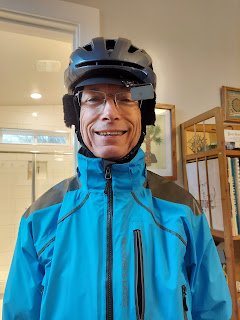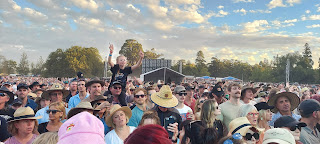Everybody's saying it, music is love - David Crosby
Several years ago, I read an essay by Zadie Smith in The New Yorker . In it, she tries to explain her encounter with Joni Mitchell's music, which for her was apparently nearly a life-changing experience. Her piece inspired me to write, and I titled my piece Reflections on Reflections on Joni Mitchell: Blue and Green. An excerpt is included below. I am currently having trouble doing something I want to do: write. So I dug this out and offer it as a stimulus to me, and you, to be receptive, and expressive in whatever ways feel real.
Music is a
vehicle, and it is hard to describe what it is exactly, and how it works. What is the mechanism of its magic? It must be a resonance that occurs, a
harmonic vibration between the performance and the listener. This is no doubt
what Zadie Smith is talking about when she talks about attunement in her New Yorker essay, Some Notes on Attunement, a Voyage Around Joni Mitchell. When the listener is receptive, the magic
happens and you feel the music with, as my mother used to say, “every fiber of
your being”. Sometimes the harmonic is so strong that it can break through
barriers in the psyche, and you can see and feel things that were formerly
locked away, or tangled up. Maybe music
is a lubricant that allows emotional knots to be untangled. When such a musical experience is happening,
it’s like you are riding a wave and there’s always gratitude.
After
reading Zadie’s piece, I downloaded Joni Mitchell's 1971 album Blue and listened. Of course, in the 41 years since the album
was released, I had heard these songs many times. But it was time to revisit this music. Little Green is the third song
on the album. Like most of the songs, it deals with sadness and loss. Her evocation of loss hit me
suddenly, and as the song ended, I was weeping, convulsing. Just
before this the elementary school shooting had occurred in Newtown, Connecticut. Listening to Little Green had facilitated for
me a connection to the “almost intolerable pain” of the parents,
grandparents, the families who lost those young children in Sandy Hook. Joni
had helped me move into that dark, dark place, not turn away. I
could momentarily face the pain of being human, the risks, the disasters, the
full catastrophe, as Zorba the Greek called it.
At Kennedy
Center in December 2012, Buddy Guy and the three surviving members of Led Zeppelin were celebrated at the Annual
Kennedy Center Honors. A friend and
fellow traveler on this musical journey had said the show was good, and it was
no disappointment. Writing this piece, I
thought about the show and did some searching, wondering how others had
expressed their reactions to it. This
idea of transformation and attunement came up.
Here’s Nate Cavalieri, writing in Spin magazine about the guitarist and
singer Gary Clark Jr., who performed at
the event:
“Make no
mistake: Gary Clark Jr.'s major-label debut (Blak and Blue) aims to introduce the Austin-based blues luminary to
the widest possible audience. But which Gary Clark Jr. do you want to meet? The
forceful stylist, sent to enrapture long-suffering blues fetishists? The
cunning neo-soul charmer who's played sidekick to Alicia Keys? How about the
"New Hendrix" that rock critics spent the past year stammering over?
Or perhaps the heir apparent to garage-rock breakouts like the Black Keys or
White Stripes? Depending on where exactly you sink into Blak and Blu, you might encounter any or all of the above; the
collection places Clark among the most promising and unpredictable artists to
break out of Austin's fertile scene in years.”
So the
musician and the listener are both shape-shifters. We move in the world and it affects us,
changes us. Joni sang the songs of Blue
at a time of personal emotional vulnerability ; she describes it this way: “At that period of
my life, I had no personal defenses, I felt like a cellophane wrapper on a pack
of cigarettes”. All her feeling was
transmitted in her music, full force. To
certain listeners, attuned to the music in some special way by life experience
or perhaps with some sort of genetic musical receptors hard wired in, something
happens. The music moves you, and your
life changes. You don’t become a
different person, there’s nothing spectacular in the result, but you know
something more about yourself that you
cherish, that allows you to carry on with more confidence. We need connections, a feeling of
relatedness. Really, we need to feel
embraced, not alone. Especially at times
of almost intolerable pain we need that almost intolerable beauty. Somehow we need to feel the music, our
music. As Jackson Browne expressed it:
“Don’t know what happens when people die.
Can’t seem to grasp it as hard as I try.
It’s like a song I can hear playing right in my ear that I can’t sing, I
can’t help listening.” Indeed.



Comments
Post a Comment